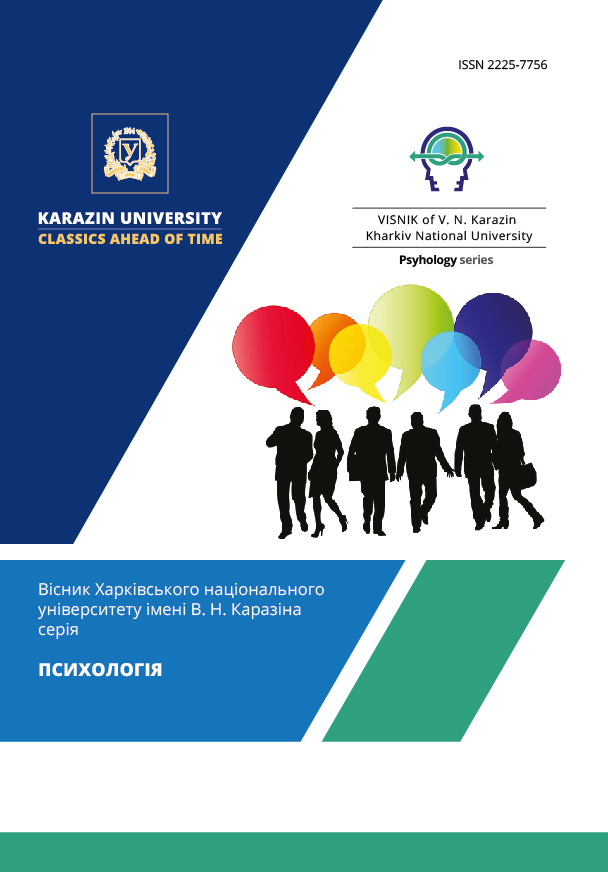Особливості особистісної ідентичності старшокласників з вираженим пізнавальним мотивом
Анотація
Метою роботи є вивчення особистісної ідентичності старшокласників з урахуванням вираженості їх пізнавального мотиву. Ідентичність розглянуто як усвідомлення самототожності, цілісності та безперервності власної особистості. Розвиток особистісної ідентичності є процесом постійного усвідомлення своєї унікальності, самобутності та неповторності. В емпіричному дослідженні виявлено, що в учнів з низьким рівнем пізнавального мотиву переважає рефлексивне та фізичне «Я», з середнім рівнем – рефлексивне, соціальне та комунікативне, з високим рівнем – фізичне та діяльне. Для респондентів загалом характерний статус особистісної ідентичності – псевдоідентичність. Для учнів з низьким рівнем пізнавального мотиву характерна дифузна ідентичність, а для старшокласників з високим рівнем пізнавального мотиву характерний мораторій, тобто криза ідентичності, що супроводжується прагненням активно розв’язати проблеми, самовизначитись та використовувати для цього різні варіанти поведінки. Виявлено, що в учнів з низьким рівнем розвитку пізнавального мотиву формування діяльного «Я» пов’язано з передчасною ідентичністю, а в учнів з високим рівнем пов’язано з досягнутою ідентичністю. Пізнавальний мотив може виступати позитивним чинником розвитку самоідентичності старшокласників.
Завантаження
Посилання
Bodnar, A.Y. Makarenko, N.G. (2014) Ways of forming the cognitive interest of an individual in the process of professional self-determination. Naukovi zapysky NaUKMA. Pedagogichni, psyhologichni nauky ta sozialna robota. 162, 32-38. http://nbuv.gov.ua/UJRN/NaUKMApp_2014_162_8
Chausova, T.V. (2018) Peculiarities of the formation of the motivational sphere of education of teenagers. Visnyk pisliadyplomnoi osvity. Seriia Sozialni ta povedinkovi nauky. 6(35), 121-134. https://doi.org/10.32405/2522‐9931‐2018‐6(35)‐121‐134
Deci, E.L. (2001) Intrinsic motivation. New York: Plenum Press.
Dusavizki, A.K. (1996) Personal development in educational activities. M.: Dom pedagogiki. 208.
Erikson, E. (1996) Identity: youth and crisis. М.: Progress. 344.
Ivanenko, B. (2020) Self-identity of the individual: static and dynamic aspects. Visnyk Lvivskogo universytetu. Seriya psyhologichni nauky. 7, 53–61.
Kirichenko, V.V. (2014) Formation of personal identity in the process of professional adaptation: dis…kand.psichol.nauk/Naz.akad.ped.nauk Ukrainy, In-t psychologii im. G. S. Kostiuka. Kyiv.
Kon, I.S. (1989) Psychology of early youth. M.: Prosveschenie, 380.
Maliar, L.V. Vakolia, Z.M. (2021) Peculiarities of students' motivation for educational activities. Naukovyi chasopys NPU imeni M. P. Dragomanova. Seriya Pedagogichni nauky: realii ta perspektyvy. 82, 102-107. https://doi.org/10.31392/NPU-nc.series5.2021.82.22
Muzychenko, L.V. (2008) Personal identity and problems of periodization of youth. Naukovi zapysky NaUKMA. Pedagogichni, psyhologichni nauky ta sozialna robota. 84, 45-49.
Obuhova, L.F. (1995) Child psychology: theories, facts, problems. М.: Trivola, 321.
Revenko, S.P. (2013) Modern approaches to the study of personality identity in youth. Naukai i osvita, 7, 196-199. http://nbuv.gov.ua/UJRN/NiO_2013_7_45
Shneyder, L.B. (2004) Professional identity: theory, experiment, training. М.: Izd-vo Mosk. psihologo-sozial. in-ta. 600.
Tyschenko, L.V. (2013) Self-identity of the individual as a general psychological problem. Naukovyi visnyk Mykolaivskogo derzhavnogo universyntnu imeni V. O. Suhomlynskogo. Seriia psyhologichni nauky. 2(10), 299–303.




